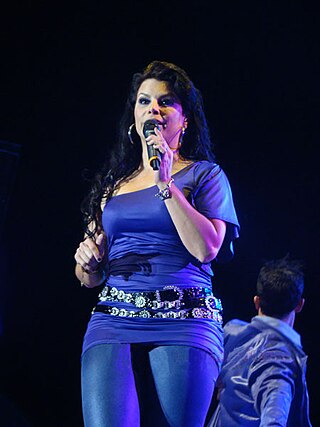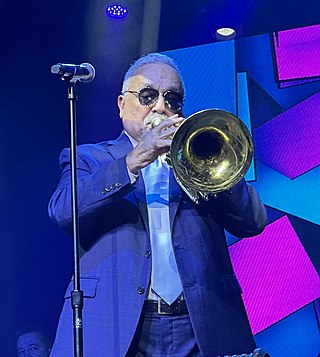Related Research Articles

Úrsula Hilaria Celia de la Caridad Cruz Alfonso, known as Celia Cruz, was a Cuban singer and one of the most popular Latin artists of the 20th century. Cruz rose to fame in Cuba during the 1950s as a singer of guarachas, earning the nickname "La Guarachera de Cuba". In the following decades, she became known internationally as the "Queen of Salsa" due to her contributions to Latin music.

Yolanda Rosa Monge Betancourt, known professionally as Yolandita Monge, is a Puerto Rican singer, actress, and television personality. She has been active in the music business since her teen years and has recorded 27 studio albums and two live albums, as well as several greatest hits compilations and special appearance recordings.

The Music of Puerto Rico has evolved as a heterogeneous and dynamic product of diverse cultural resources. The most conspicuous musical sources of Puerto Rico have primarily included European, Indigenous, and African influences, although many aspects of Puerto Rican music reflect origins elsewhere in the Caribbean. Puerto Rican music culture today comprises a wide and rich variety of genres, ranging from essentially native genres such as bomba, danza, and plena to more recent hybrid genres such as salsa, Latin trap and reggaeton. Broadly conceived, the realm of "Puerto Rican music" should naturally comprise the music culture of the millions of people of Puerto Rican descent who have lived in the United States, especially in New York City. Their music, from salsa to the boleros of Rafael Hernández, cannot be separated from the music culture of Puerto Rico itself.

Marco Antonio Muñiz, known professionally as Marc Anthony, is an American singer, songwriter, and actor. He is the top selling tropical salsa artist of all time. A four-time Grammy Award and eight-time Latin Grammy Award winner, he has sold more than 12 million albums worldwide. Known for his Latin salsa numbers and ballads, Anthony has won numerous awards and his achievements have been honored through various recognitions. He was the recipient of the 2009 Congressional Hispanic Caucus Institute (CHCI) Lifetime Achievement Award. He also received the "2009 CHCI Chair's Lifetime Achievement Award" on September 16, 2009. He holds the Guinness World Record for best-selling tropical/salsa artist and the most number-one albums on the Billboard Tropical Albums year-end charts. He is also the artist with the most number one songs on the Billboard Latin Tropical Airplay chart with 32 songs.

Héctor Juan Pérez Martínez, better known as Héctor Lavoe, was a Puerto Rican salsa singer. Lavoe is considered to be possibly the best and most important singer and interpreter in the history of salsa music because he helped to establish the popularity of this musical genre in the decades of 1960s, 1970s and 1980s. His personality, style and the qualities of his voice led him to a successful artistic career in the whole field of Latin music and salsa during the 1970s and 1980s. The cleanness and brightness of his voice, coupled with impeccable diction and the ability to sing long and fast phrases with total naturalness, made him one of the favorite singers of the Latin public.

Olga Teresa Tañón Ortiz is a Puerto Rican singer-songwriter. Over the course of her career, she has earned two Grammy Awards, three Latin Grammy Awards, and 29 Premio Lo Nuestro Awards.

Linda Viera Caballero, better known as La India, is a Puerto Rican singer and songwriter of salsa, house music and Latin pop. La India has been nominated for both Grammy and Latin Grammy Awards, winning the Latin Grammy Award for Best Salsa Album for the Intensamente La India Con Canciones De Juan Gabriel album.
Michael Stuart is an American salsa singer, songwriter and actor.

Cheo Feliciano was a Puerto Rican singer and composer of salsa and bolero music. Feliciano was the owner of a recording company called "Coche Records". He was the first tropical singer to perform at the "Amira de la Rosa Theater" in Barranquilla, Colombia, and in 1987 he played the role of Roberto Clemente's father in the musical Clemente.

Gilberto Santa Rosa Cortés, nicknamed "El Caballero de la Salsa", is a Puerto Rican bandleader and singer of salsa and bolero. He is a six-time Grammy Award winner and has sold over three million records in the United States and Puerto Rico. Santa Rosa also starred in a comedy.

William Anthony Colón Román is an American Salsa musician and social activist. He began his career as a trombonist but also sings, writes, produces and acts. Colón is considered a pioneer of Salsa music and a best-selling artist in the genre, having been a key figure in the nascent New York City scene associated with the legendary Fania Records. He is also noteworthy for having assumed the gangster image in his album covers before it was culturally popular. Since the 1980s he has at times been deeply involved in the politics of New York City.
Tony Vega Cesar, known professionally as Tony Vega is a Puerto Rican salsa singer.

Jerry Rivera is a Puerto Rican salsa singer and songwriter.
Nino Segarra, is a singer, composer, musician and musical arranger.
Jorge Manuel López, also known as Giro Lopez, is a Puerto Rican salsa musician. Giro began his career as part of the boy band of Puerto Rico called Los Chicos. Two singles by "Giro" Jorge López, "Si Tu Supieras" and "Mi Forma de Sentir", reached #1 on the Latin Tropical Airplay. In 1995, Giro received a Lo Nuestro award for "New Tropical Singer of the Year" and in 1996 also was nominated for Best Male Tropical Singer of the Year. He won a Gold Record at the New Jersey OTT Awards, presented by Billboard magazine.
Arthur Hanlon is an American pianist, songwriter and arranger who is widely known in the Latin music realm and has had multiple hits on the Billboard charts. Born to Irish-American parents, he hails from Detroit, Michigan, but found his calling in Latin music and has received widespread recognition in that realm, becoming the first pianist to reach the Billboard Latin airplay charts in more than a decade and the first to have a No. 1 on Billboard's Tropical Airplay chart. Arthur’s most current work includes a series of collaborations all under the Sony label. He is an exclusive Yamaha Pianos artist.
Mary Lisa Marrero Vázquez better known by her stage name Lisa M, is a Puerto Rican rapper, singer, composer, dancer, record producer, and global DJ. She is known as the first female rapper artist to debut in Latin America. In 2019, Billboard identified her as one of the leading women performers in the Latin urban genre, along with Glory, Ivy Queen, Natti Natasha, and Karol G.

Ojalá Que Llueva Café is the fourth studio album by Dominican singer-songwriter Juan Luis Guerra released in 1989 by Karen Records. It is considered one of his most emblematic and important albums. The album set the musical path for his later albums, re-formulating Dominican merengue and bachata music through the contemporary elements of pop, rock, salsa, or jazz. Incorporating socially conscious lyrics with danceable merengues and romantic-poetic bachatas, the album is considered one of the most important albums of his discography.
Canelita Medina was a Venezuelan salsa singer noted for singing in the Cuban Son style. She had always dreamt of becoming a singer as a young girl, imitating the salsa singer Celia Cruz. When she entered a radio talent program on Radio Continente, she caught the attention of talent agents with her unique voice. Over the years, Canelita has achieved great success, both nationally and internationally, and is successful to this day. Through more than 50 years of her life as an artist, Canelita Medina has received many awards.
References
- ↑ César Miguel Rondón; Frances R. Aparicio; Jackie White (March 2008). The book of salsa: a chronicle of urban music from the Caribbean to New York City. UNC Press Books. ISBN 978-0-8078-5859-2 . Retrieved 24 May 2011.
- 1 2 3 4 "Trina Medina". Salsa Talks. Retrieved 24 May 2011.
- ↑ "Trina Medina". IMDB. Retrieved 24 May 2011.